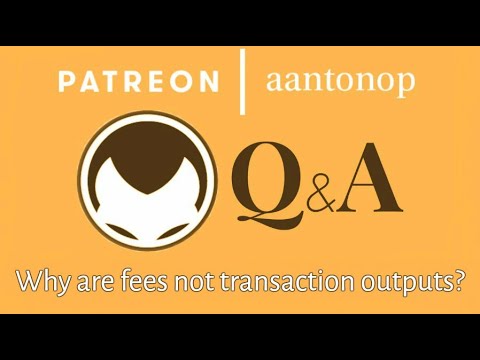Why do fees not show up as transaction outputs? Where do transaction fees go? How do miners receive fees?
More about transaction fees can be found in these chapters:
https://github.com/bitcoinbook/bitcoinbook/blob/f8b883dcd4e3d1b9adf40fed59b7e898fbd9241f/ch06.asciidoc
https://github.com/bitcoinbook/bitcoinbook/blob/df1828b7205a5950a16a3182cf9b15421ee70658/ch10.asciidoc
This question is from the December monthly subscriber session, which took place on December 15th 2018. If you want early-access to talks and a chance to participate in the monthly live Q&As with Andreas, become a patron: https://www.patreon.com/aantonop
RELATED:
How do I choose a wallet? – https://youtu.be/tN6b62sEpsY
Secure, tiered storage system – https://youtu.be/uYIVuZgN95M
Hardware wallets and attack surface – https://youtu.be/8mpDcBfNA7g
Setting up secure storage devices – https://youtu.be/wZ9LxLLvfXc
What is a private key? – https://youtu.be/xxfUpIV9wRI
How do mneomonic seeds work? – https://youtu.be/wWCIQFNf_8g
Using paper wallets – https://youtu.be/cKehFazo8Pw
Wallet design and mass adoption – https://youtu.be/WbZX6BDZJHc
Cryptographic primitives – https://youtu.be/RIckQ6RBt5E
Public keys vs. addresses – https://youtu.be/8es3qQWkEiU
Re-using addresses – https://youtu.be/4A3urPFkx8g
Passphrases and seed storage – https://youtu.be/jP7pEgBpaO0
Coin selection and privacy – https://youtu.be/3Ck683CQGAQ
Multi-signature and distributed storage – https://youtu.be/cAP2u6w_1-k
Nonces, mining, and quantum computing – https://youtu.be/d4xXJh677J0
Is quantum computing a threat? – https://youtu.be/wlzJyp3Qm7s
Spam transactions and Child Pays For Parent – https://youtu.be/t3c0E4fkSNs
Orphan blocks and stuck transactions – https://youtu.be/MsdW0CTYwyY
Miners, pools, and consensus – https://youtu.be/JHz7LM4ncLw
Software distribution security – https://youtu.be/_V0vqy046YM
Protocol development security – https://youtu.be/4fsL5XWsTJ4
Geopolitics and state-sponsored attacks – https://youtu.be/htxPRTJLK-k
How to get people to care about security – https://youtu.be/Ji1lS9NMz1E
Honest nodes and consensus – https://youtu.be/KAhY2ymI-tg
Why running a node is important – https://youtu.be/oX0Yrv-6jVs
Andreas M. Antonopoulos is a technologist and serial entrepreneur who has become one of the most well-known and respected figures in bitcoin.
Follow on Twitter: @aantonop https://twitter.com/aantonop
Website: https://antonopoulos.com/
He is the author of two books: “Mastering Bitcoin,” published by O’Reilly Media and considered the best technical guide to bitcoin; “The Internet of Money,” a book about why bitcoin matters.
Subscribe to the channel to learn more about Bitcoin & open blockchains; click on the red bell to enable notifications about new videos!
MASTERING BITCOIN, 2nd Edition: https://amzn.to/2xcdsY9
Translations of MASTERING BITCOIN: https://bitcoinbook.info/translations-of-mastering-bitcoin/
THE INTERNET OF MONEY, v1: https://amzn.to/2ykmXFs
THE INTERNET OF MONEY, v2: https://amzn.to/2IIG5BJ
Translations of THE INTERNET OF MONEY:
Spanish, ‘Internet del Dinero’ (v1) – https://amzn.to/2yoaTTq
French, ‘L’internet de l’argent’ (v1) – https://www.amazon.fr/Linternet-largent-Andreas-M-Antonopoulos/dp/2856083390
Russian, ‘Интернет денег’ (v1) – https://www.olbuss.ru/catalog/ekonomika-i-biznes/korporativnye-finansy-bankovskoe-delo/internet-deneg
Vietnamese, ‘Internet Của Tiền Tệ’ (v1) – https://alphabooks.vn/khi-tien-len-mang
MASTERING ETHEREUM (Q4): https://amzn.to/2xdxmlK
Music: “Unbounded” by Orfan (https://www.facebook.com/Orfan/)
Outro Graphics: Phneep (http://www.phneep.com/)
Outro Art: Rock Barcellos (http://www.rockincomics.com.br/)
source












u got to start making some drawings…. really….
this explained in a white board "would be more" compreensible… 🙂
I learn something new with every video Andreas publishes.
Cool thanks, TIL
Why we have to pay fees ? We should have initial fee payed one time that is all .coinbase is get rich in our back.
Smashed the like
@aantonop As the mining reward is blocked from spending for some time after block is discovered does that also apply for the fees? Are those on “spend lock” too?
yes I definitely enjoyed the answer listening to it thrice
simple and clear as always
Would it be possible to implement a feature where a full node is selected randomly to receive a certain percentage of the fees? The goal being to encourage folks to run full nodes. How about LN nodes? And if so, would it contribute to the anti-fragility of bitcoin?
fascinating stuff. Can you discuss how a mining pool then distributes this reward to it's pack of miner's. I assume it is a centralized process where miners trust the pool leader to do it fairly. I was wondering if there is a way to write a contract where it automatically pays out the block reward as a proportion of hash rate to all contributors without having to trust the entity running the mining pool. Thanks.
This video is fantastic
I was just pondering this a few days ago. Thanks for the info.
Very good but you missed an opportunity. Unfortunately one of the biggest hurdles talking to people is their not understanding the purpose of the miner reward. It serves 2 purposes. 1) Distribute the bitcoins widely and 2) Secure the network. At the beginning of the experiment bitcoins were not worth much, so a large miner reward was justified. But if you subsidize something you tend to get more of it. The POW of the bitcoin network is incredible now because users are not paying it directly. Over time with the halvings, the free market will determine what the transactions fee's will be, and I bet it will be more than today. But that is not really a problem because of evolving second layer solutions.
Nice one
I remember attending a seminar with a Bitcoin / Blockchain expert from Deloitte who claimed that if your transaction is mined in a block that gets orphaned and does not help to produce the longest proof of work chain your fees are lost and you have to try to make the transaction again. When I called out on him he said that he is sure and that we should agree to disagree and discuss this after the event… He should have watched your video would have saved him an embarrassing moment 😛 I think it is fine if people who have bitcoin don't understand this but a consultant in that field should be a little better educated (:
Thanks, Andreas!